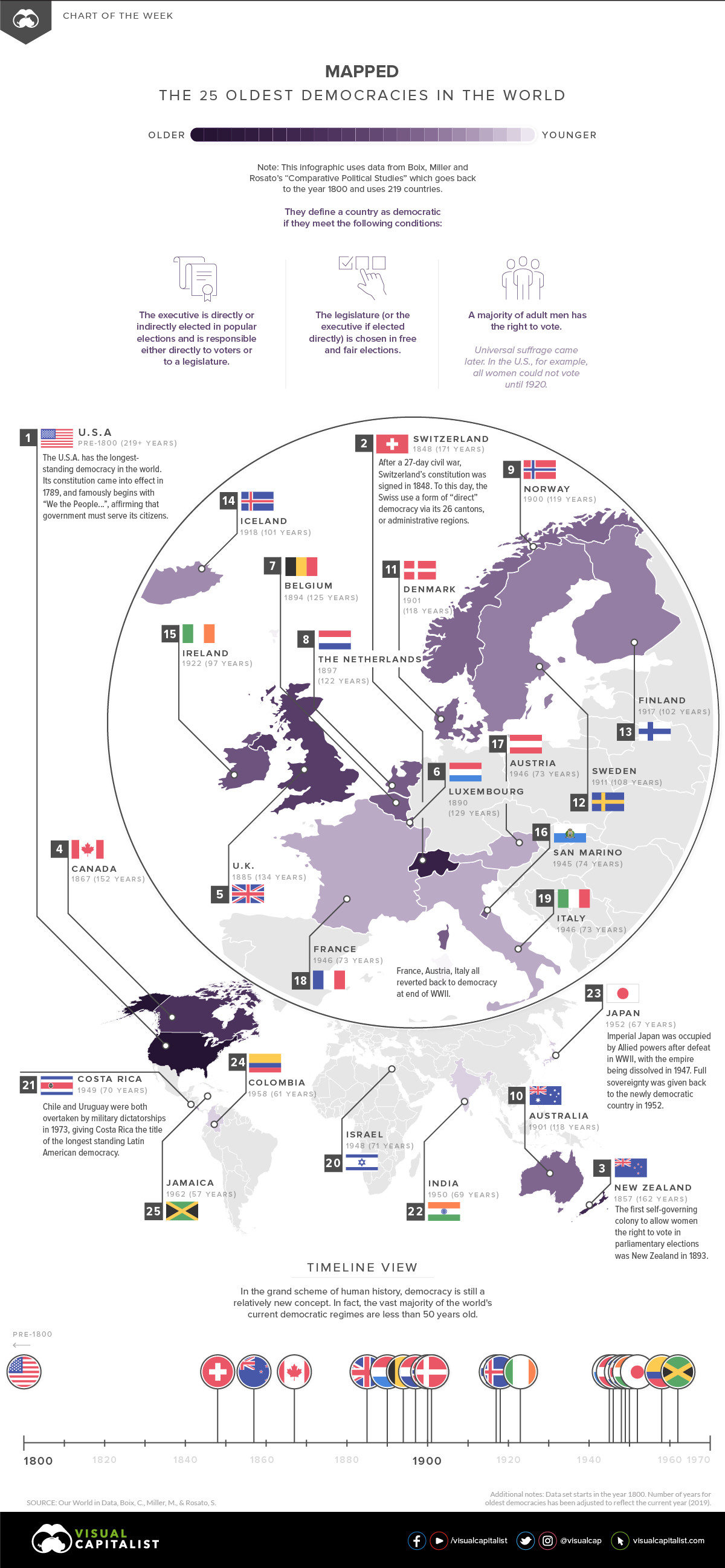Mapped: The world’s oldest democracies

The United States is the only country with a continuous democracy more than 200 years old.
Image: REUTERS/John Pryke
Stay up to date:
United Kingdom
Which country today is the world’s oldest democracy?
It’s a loaded question — as you’ll see, there is plenty of nuance involved in the answer.
Depending on how you define things, there are many jurisdictions that can lay claim to this coveted title. Let’s dive into some of these technicalities, and then we can provide context for how we’ve defined democracy in today’s particular chart.

Laying the Claim
If you’re looking for the very first instance of democracy, credit is often attributed to Ancient Athens. It’s there the term originated, based on the Greek words demos (“common people”) and kratos (“strength”). In the 6th century BC, the city-state allowed all landowners to speak at the legislative assembly, blazing a path that would be followed by democracies in the future.
However, Ancient Athens wasn’t really a country in the modern sense. It’s also not around anymore, so that certainly disqualifies the oldest continuous democratic country today.
Iceland and the Isle of Man both have interesting claims to democracy. Each has a parliamentary body that is over 1,000 years old, making them the longest standing democratic institutions in the world. But Iceland only got its independence in 1944 from Denmark — and while it is self-governing, the Isle of Man is not a country.
Of course, when we’re talking about democracy today, we’re really talking about universal suffrage. New Zealand may have the best claim here — by 1893, the self-governing colony allowed all women and ethnicities to vote in elections.
A Common Set of Criteria
While many civilizations, institutions, and societies have a rightful claim to contributing to democracy (including many we did not mention above), measuring the world’s oldest democracies today requires following a common set of criteria.
In today’s chart, we used data from Boix, C., Miller, M., & Rosato, S. (2013, 2018), which looks at the age of democratic regimes for 219 countries since the year 1800. Countries are classified as democracies if they meet the following conditions:
- Executive:
The executive is directly or indirectly elected in popular elections and is responsible either directly to voters or to a legislature. - Legislature:
The legislature (or the executive if elected directly) is chosen in free and fair elections. - Voting:
A majority of adult men has the right to vote.
Democracies also have to be continuous in order to count. Although France has important democratic origins, the country is currently on its fifth republic since the French Revolution, thanks to Napoleon, Vichy France, and other instances where things went sideways.
While the above criteria isn’t perfect, it does create a stable playing field to assess when countries adopted democratic systems in principle. (However, the exclusion of certain populations, notably women and specific ethnicities, in being given the right to vote, or to be elected to legislative assemblies, is another story).
The Oldest Democracies, by Number of Years
Using the above criteria, here is a list of the world’s 10 oldest democracies:

Using this specific criteria, there is only one country with continuous democracy for more than 200 years (The United States), and fourteen countries with democracies older than a century.
As you’ll notice in the data, many countries became democracies after World War II. The Japanese Empire, for example, was occupied by Allied Forces and then dissolved. It then regained sovereignty afterwards, emerging as a newly democratic regime.
Final notes: The data here goes back to 1800, and we have adjusted it to be current as of 2019. One change we made was to Tunisia, which is listed as the 24th oldest democracy in the data. Based on our due diligence on the subject, we felt it was appropriate to leave it off the list, given that most experts see the country as only achieving the status in 2014 in the post-Arab Spring era.
Don't miss any update on this topic
Create a free account and access your personalized content collection with our latest publications and analyses.
License and Republishing
World Economic Forum articles may be republished in accordance with the Creative Commons Attribution-NonCommercial-NoDerivatives 4.0 International Public License, and in accordance with our Terms of Use.
The views expressed in this article are those of the author alone and not the World Economic Forum.
Related topics:
Forum Stories newsletter
Bringing you weekly curated insights and analysis on the global issues that matter.
More on Global CooperationSee all
Jai Shroff
April 22, 2025
Robert Muggah and Jago Salmon
April 21, 2025
Alejandra Arochas and Constanza Torres
April 15, 2025
Zainab Azizi
April 9, 2025
Nii Simmonds and Obinna Isiadinso
April 9, 2025
Spencer Feingold
April 8, 2025





